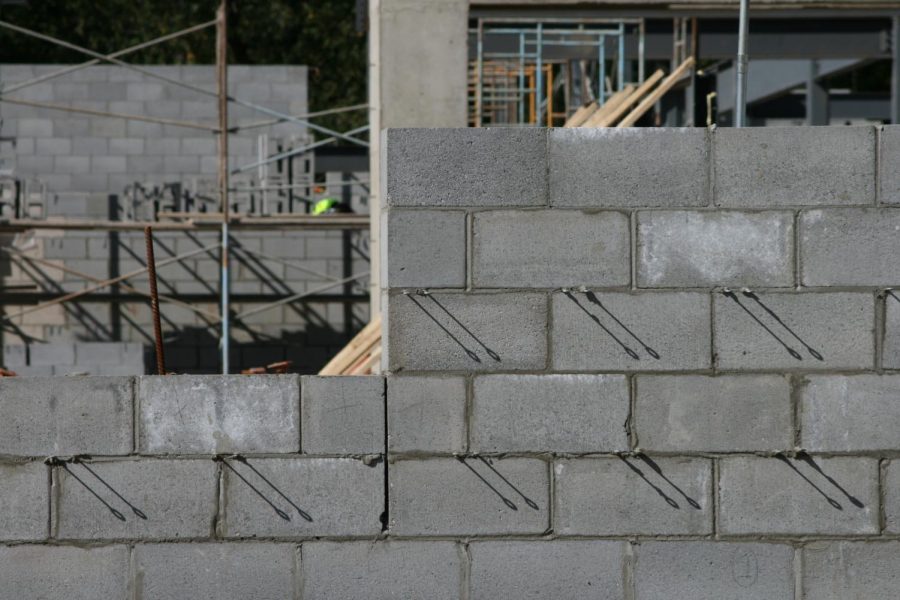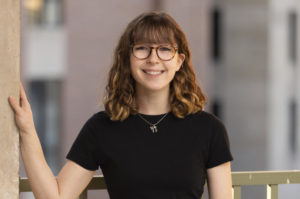Position of Media Specialist terminated at PPS middle schools
Construction of the new North Middle School building began in May 2017. The building is expected to open to students in the 2019 school year.
October 24, 2017
UPDATE: On January 8th, 2018 Portage Public Schools issued an official notice indicating that the policy which removed media specialists from the middle school media centers was being rescinded. At the start of the second semester, students will find media specialists resuming their former positions.
The memo claims the decision to remove media specialists was never intended to be permanent and that they planned in the future “to review the position in the context of the opening of our new middle schools.” After complaints about the negative consequences of the policy intensified, the District decided change was necessary. “It became clear, especially in our conversations with teachers, that the negative impacts to students and the media program were greater than anticipated,” said Daniel Vomastek, the Director of Information and Technology Systems for PPS. “Thus, we decided to accelerate the timeline to restore staffing.”
Original Story:
Is it really a library without a librarian? Students and teachers at the middle schools are wrestling with that question this year after Portage Public Schools’ reconstruction of the middle school media centers resulted in the reassignment of the middle school librarians to elementary school positions.
The administration team informed the District Advisory Council (DAC) in late May about the changes and the reorganization was finalized over the course of the summer. Part-time clerks have now replaced media specialists at WMS, CMS, and NHS to assist students in checking out books.
One impetus for the change is the nature of the media center in the new middle schools. “I think the changes we are making reflect the needs of students for the 21st century,” said Superintendent Mark Bielang. “The media centers, which will now be referred to as Learning Resource Centers, are designed to evolve into what libraries will become.” The new Learning Resource Center will be primarily technology-driven, but will also house a limited print collection.
This was the plan from the beginning of the building process, according the the district-wide construction manager Robert McGraw. “The middle school original plans had 3 or 4 variations, but the general concept was the same,” he said.
The changes were put in place to not only follow suit with the new middle schools, but also to “free up space in the budget for a new service at the elementary level,” said Portage Northern’s representative for the DAC, social studies teacher Kellie Pittman. These new positions are called Student and Family Engagement Specialists. This full-time job was established to alleviate the stress placed on elementary school principals engaging in time-consuming disciplinary action. While “the staffing issue is a separate issue from the new media centers themselves,” Bielang said, “it’s a part of a larger picture of support we are trying to create at different levels.”
Some teachers do not share the Superintendent’s confidence. Newly-retired West Middle School teacher Linda Holzwarth, 2016 Michigan Teacher of the Year, said she “[wishes] the administrators had asked teachers what their thoughts were about the matter.” Visibly disappointed in the changes at the media centers, she added: “Our kids have read more books, participated in book clubs, and written hundreds of book reviews, all thanks to our media specialist. Now that incredible flood of excitement will dry up without her.”
Even students who are new to the middle school are sensing the difference in this year already. Sixth grader Ben Torrence enjoys attending North Middle, but said, “It’s weird not having actual librarians.” He is also already having difficulties without the media specialists: “It’s hard to figure out some of this new technology stuff.”
As for current middle schoolers, the school board-approved curriculum “will not be met,” said PN media specialist Jeanna Walker. PPS has a comprehensive media literacy curriculum that includes teaching students how to effectively conduct research, locate and analyze reliable sources, find texts to match their reading level, and appropriately utilize social networking tools, among other skills. Because these tools are essential to know as students enter high school, without media specialists, the burden of teaching of library science is placed on content-area teachers, who are less educated in the library science field.
Furthermore, the curriculums for this school year – the first year without media specialists – have not yet been modified to absorb these changes. This does not appear to be a concern for Superintendent Bielang, who said, “I’m not sure how much fidelity there has been over the years in the delivery of that curriculum. . . my understanding is that a good bit of the skills that students need are being taught in ELA courses.”
Cutting school library funding and eliminating the position of media specialist is a trend that is appearing all over the nation, but is has come with negative academic consequences. A study by the Education Law Center and Health Sciences Library Consortium revealed that, in the 22 states studied, having a full-time librarian impacted student achievement, especially for “the most vulnerable students.” The Pennsylvania System of School Achievement, the state’s official testing board, also found that reading and writing scores were better for students who had a full time librarian compared to those who did not.










Lexi Doll • Mar 6, 2018 at 11:48 am
I love that you guys are bringing attention to an issue that people wouldn’t normally think to care about. Librarians are very important and helpful and this article proves that.